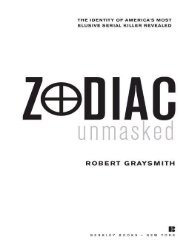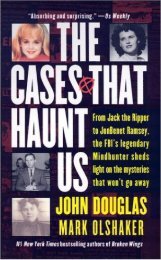- Page 1:
Q Inside the Mind of BTK The True S
- Page 5 and 6:
Q Inside the Mind of BTK The True S
- Page 7 and 8:
Q CONTENTS Acknowledgments vii Intr
- Page 9 and 10:
Q Acknowledgments I am indebted to
- Page 11 and 12:
Q Introduction It began in the autu
- Page 13 and 14:
Introduction 3 By 1979, I was in th
- Page 15 and 16:
Introduction 5 and autopsy reports,
- Page 17 and 18:
Introduction 7 permits. And, just a
- Page 19:
Introduction 9 3. Explain why—at
- Page 23 and 24:
Q 1 Somewhere inside my head, the m
- Page 25 and 26:
My Lifelong Hunt for BTK 15 what ma
- Page 27 and 28:
My Lifelong Hunt for BTK 17 what re
- Page 29 and 30:
My Lifelong Hunt for BTK 19 It was
- Page 31 and 32:
My Lifelong Hunt for BTK 21 up all
- Page 33 and 34:
Q 2 The sun had yet to appear in th
- Page 35 and 36:
My Lifelong Hunt for BTK 25 be nece
- Page 37 and 38:
My Lifelong Hunt for BTK 27 to Wich
- Page 39 and 40:
My Lifelong Hunt for BTK 29 But he
- Page 41 and 42:
My Lifelong Hunt for BTK 31 Althoug
- Page 43 and 44:
Q 3 Iglanced back down at the polic
- Page 45 and 46:
My Lifelong Hunt for BTK 35 of thei
- Page 47 and 48:
My Lifelong Hunt for BTK 37 But now
- Page 49 and 50:
My Lifelong Hunt for BTK 39 Cruiser
- Page 51 and 52:
My Lifelong Hunt for BTK 41 Police
- Page 53 and 54:
My Lifelong Hunt for BTK 43 Within
- Page 55 and 56:
Q 4 One down, three to go,” I tol
- Page 57 and 58:
My Lifelong Hunt for BTK 47 The vic
- Page 59 and 60:
My Lifelong Hunt for BTK 49 shot tw
- Page 61 and 62:
My Lifelong Hunt for BTK 51 running
- Page 63 and 64:
My Lifelong Hunt for BTK 53 tims we
- Page 65 and 66:
My Lifelong Hunt for BTK 55 whether
- Page 67 and 68: My Lifelong Hunt for BTK 57 know. B
- Page 69 and 70: My Lifelong Hunt for BTK 59 In the
- Page 71 and 72: Q 5 It was getting late. When I loo
- Page 73 and 74: My Lifelong Hunt for BTK 63 From so
- Page 75 and 76: My Lifelong Hunt for BTK 65 Reading
- Page 77 and 78: My Lifelong Hunt for BTK 67 Steve u
- Page 79 and 80: My Lifelong Hunt for BTK 69 murder
- Page 81 and 82: My Lifelong Hunt for BTK 71 detecti
- Page 83 and 84: Q 6 The next morning, I awoke at 5:
- Page 85 and 86: My Lifelong Hunt for BTK 75 For Wic
- Page 87 and 88: My Lifelong Hunt for BTK 77 ing for
- Page 89 and 90: My Lifelong Hunt for BTK 79 As a ch
- Page 91 and 92: My Lifelong Hunt for BTK 81 change
- Page 93 and 94: My Lifelong Hunt for BTK 83 stain i
- Page 95 and 96: My Lifelong Hunt for BTK 85 my opin
- Page 97 and 98: My Lifelong Hunt for BTK 87 A few m
- Page 99 and 100: My Lifelong Hunt for BTK 89 sick fa
- Page 101 and 102: Q 7 How do you trap a shadow? Where
- Page 103 and 104: My Lifelong Hunt for BTK 93 I sugge
- Page 105 and 106: My Lifelong Hunt for BTK 95 For the
- Page 107 and 108: My Lifelong Hunt for BTK 97 power,
- Page 109 and 110: My Lifelong Hunt for BTK 99 Hazelwo
- Page 111 and 112: My Lifelong Hunt for BTK 101 he can
- Page 113 and 114: My Lifelong Hunt for BTK 103 first
- Page 115 and 116: My Lifelong Hunt for BTK 105 1974,
- Page 117: My Lifelong Hunt for BTK 107 “In
- Page 121: A C T T W O The Capture and Arrest
- Page 124 and 125: 114 INSIDE THE MIND OF BTK time, my
- Page 126 and 127: 116 INSIDE THE MIND OF BTK Whenever
- Page 128 and 129: 118 INSIDE THE MIND OF BTK “I nev
- Page 130 and 131: 120 INSIDE THE MIND OF BTK a danger
- Page 132 and 133: 122 INSIDE THE MIND OF BTK house. R
- Page 134 and 135: 124 INSIDE THE MIND OF BTK For two
- Page 136 and 137: 126 INSIDE THE MIND OF BTK It dawne
- Page 138 and 139: Q Close to two hours had passed, an
- Page 140 and 141: 130 INSIDE THE MIND OF BTK Rader wr
- Page 142 and 143: 132 INSIDE THE MIND OF BTK it in hu
- Page 144 and 145: 134 INSIDE THE MIND OF BTK but not
- Page 146 and 147: 136 INSIDE THE MIND OF BTK their dr
- Page 148 and 149: 138 INSIDE THE MIND OF BTK Somethin
- Page 150 and 151: Q Icouldn’t get over it. I’d ne
- Page 152 and 153: 142 INSIDE THE MIND OF BTK reading
- Page 154 and 155: 144 INSIDE THE MIND OF BTK Rader wo
- Page 156 and 157: 146 INSIDE THE MIND OF BTK and he
- Page 158 and 159: 148 INSIDE THE MIND OF BTK “COME
- Page 160 and 161: 150 INSIDE THE MIND OF BTK he never
- Page 162 and 163: Q My computer screen pulsed and glo
- Page 164 and 165: 154 INSIDE THE MIND OF BTK One nigh
- Page 166 and 167: 156 INSIDE THE MIND OF BTK on his d
- Page 168 and 169:
158 INSIDE THE MIND OF BTK So one a
- Page 170 and 171:
160 INSIDE THE MIND OF BTK things h
- Page 172 and 173:
Q The mouse pad on my computer had
- Page 174 and 175:
164 INSIDE THE MIND OF BTK have rep
- Page 176 and 177:
166 INSIDE THE MIND OF BTK When he
- Page 178 and 179:
168 INSIDE THE MIND OF BTK along ha
- Page 180 and 181:
170 INSIDE THE MIND OF BTK Over the
- Page 182 and 183:
172 INSIDE THE MIND OF BTK of his p
- Page 184 and 185:
174 INSIDE THE MIND OF BTK In an en
- Page 186 and 187:
176 INSIDE THE MIND OF BTK the hous
- Page 188 and 189:
178 INSIDE THE MIND OF BTK wrists a
- Page 190 and 191:
180 INSIDE THE MIND OF BTK dreamed
- Page 192 and 193:
182 INSIDE THE MIND OF BTK Leaving
- Page 194 and 195:
Q I’d been drifting for far too m
- Page 196 and 197:
186 INSIDE THE MIND OF BTK But the
- Page 198 and 199:
188 INSIDE THE MIND OF BTK The comb
- Page 200 and 201:
190 INSIDE THE MIND OF BTK “I cou
- Page 202 and 203:
192 INSIDE THE MIND OF BTK home on
- Page 204 and 205:
194 INSIDE THE MIND OF BTK month, w
- Page 206 and 207:
196 INSIDE THE MIND OF BTK that he
- Page 208 and 209:
198 INSIDE THE MIND OF BTK murderer
- Page 210 and 211:
200 INSIDE THE MIND OF BTK “That,
- Page 212 and 213:
202 INSIDE THE MIND OF BTK was whit
- Page 214 and 215:
204 INSIDE THE MIND OF BTK didn’t
- Page 216 and 217:
206 INSIDE THE MIND OF BTK The dog
- Page 218 and 219:
208 INSIDE THE MIND OF BTK That was
- Page 220 and 221:
210 INSIDE THE MIND OF BTK hired as
- Page 222 and 223:
212 INSIDE THE MIND OF BTK I didn
- Page 224 and 225:
214 INSIDE THE MIND OF BTK Over the
- Page 226 and 227:
216 INSIDE THE MIND OF BTK Over tim
- Page 228 and 229:
218 INSIDE THE MIND OF BTK A week b
- Page 230 and 231:
220 INSIDE THE MIND OF BTK sixty-tw
- Page 232 and 233:
222 INSIDE THE MIND OF BTK several
- Page 234 and 235:
Q The sun was coming up. I’d been
- Page 236 and 237:
226 INSIDE THE MIND OF BTK he had b
- Page 238 and 239:
228 INSIDE THE MIND OF BTK read poe
- Page 240 and 241:
230 INSIDE THE MIND OF BTK Over tim
- Page 242 and 243:
232 INSIDE THE MIND OF BTK about th
- Page 244 and 245:
Q The moment Ken Landwehr walked in
- Page 246 and 247:
236 INSIDE THE MIND OF BTK the man
- Page 248 and 249:
238 INSIDE THE MIND OF BTK “The W
- Page 250 and 251:
240 INSIDE THE MIND OF BTK The next
- Page 252 and 253:
242 INSIDE THE MIND OF BTK party .
- Page 254 and 255:
244 INSIDE THE MIND OF BTK “What
- Page 256 and 257:
246 INSIDE THE MIND OF BTK The most
- Page 258 and 259:
Q Landwehr needed a smoke. “I’l
- Page 260 and 261:
250 INSIDE THE MIND OF BTK He finis
- Page 262 and 263:
252 INSIDE THE MIND OF BTK But a fe
- Page 264 and 265:
254 INSIDE THE MIND OF BTK of mine,
- Page 266 and 267:
256 INSIDE THE MIND OF BTK young ch
- Page 268 and 269:
Q Landwehr had gone downstairs to s
- Page 270 and 271:
260 INSIDE THE MIND OF BTK I did. A
- Page 272 and 273:
262 INSIDE THE MIND OF BTK Lundin t
- Page 274 and 275:
264 INSIDE THE MIND OF BTK As Rader
- Page 276 and 277:
266 INSIDE THE MIND OF BTK “Prett
- Page 278 and 279:
268 INSIDE THE MIND OF BTK would ne
- Page 280 and 281:
270 INSIDE THE MIND OF BTK few bloc
- Page 282 and 283:
272 INSIDE THE MIND OF BTK to think
- Page 285 and 286:
Q 21 On May 28, eight months after
- Page 287 and 288:
Meeting BTK: An Exclusive Interview
- Page 289 and 290:
Meeting BTK: An Exclusive Interview
- Page 291 and 292:
Meeting BTK: An Exclusive Interview
- Page 293 and 294:
Meeting BTK: An Exclusive Interview
- Page 295 and 296:
Meeting BTK: An Exclusive Interview
- Page 297 and 298:
Meeting BTK: An Exclusive Interview
- Page 299 and 300:
Meeting BTK: An Exclusive Interview
- Page 301 and 302:
Meeting BTK: An Exclusive Interview
- Page 303 and 304:
Meeting BTK: An Exclusive Interview
- Page 305 and 306:
Meeting BTK: An Exclusive Interview
- Page 307 and 308:
Meeting BTK: An Exclusive Interview
- Page 309 and 310:
Q 23 Dennis Rader sat in the black
- Page 311 and 312:
Meeting BTK: An Exclusive Interview
- Page 313 and 314:
Meeting BTK: An Exclusive Interview
- Page 315 and 316:
Meeting BTK: An Exclusive Interview
- Page 317 and 318:
Meeting BTK: An Exclusive Interview
- Page 319 and 320:
Meeting BTK: An Exclusive Interview
- Page 321 and 322:
Meeting BTK: An Exclusive Interview
- Page 323 and 324:
Meeting BTK: An Exclusive Interview
- Page 325 and 326:
Meeting BTK: An Exclusive Interview
- Page 327 and 328:
Q 25 Afew hours later back in Wichi
- Page 329 and 330:
Meeting BTK: An Exclusive Interview
- Page 331 and 332:
Meeting BTK: An Exclusive Interview
- Page 333 and 334:
Meeting BTK: An Exclusive Interview
- Page 335 and 336:
Meeting BTK: An Exclusive Interview
- Page 337 and 338:
Meeting BTK: An Exclusive Interview
- Page 339 and 340:
Meeting BTK: An Exclusive Interview
- Page 341 and 342:
Meeting BTK: An Exclusive Interview
- Page 343 and 344:
Meeting BTK: An Exclusive Interview
- Page 345 and 346:
Meeting BTK: An Exclusive Interview
- Page 347 and 348:
Q About the Authors John E. Douglas
- Page 349 and 350:
A Q Index ABC, 81 ADT Security, 190
- Page 351 and 352:
INDEX 341 Fletcher, Raymond, 47, 48
- Page 353 and 354:
INDEX 343 Q Quantico, Virginia, 2,
- Page 355 and 356:
Dennis L. Rader, from boy to family
- Page 357 and 358:
Joseph Otero, undated photo, murder
- Page 359 and 360:
Two examples of Dennis Rader’s ha
- Page 361 and 362:
The Park City home where Rader live





